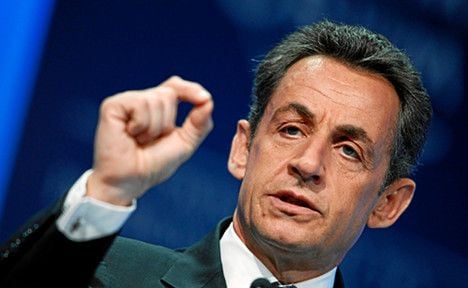Talking to the pro-government Le Figaro, Sarkozy rejected his left-wing opponent’s plans to allow foreigners to vote in local polls, while promising a referendum on restricting the right to unemployment benefits.
Sarkozy stopped short of formally declaring his candidacy for re-election, amid widespread reports that he is due to do so on Wednesday next week, but left no doubt that his mind was made up: “The date is approaching.”
Portraying himself as a defender of traditional values in a time of change, Sarkozy sought to put distance between himself and Socialist rival François Hollande, while wooing supporters of far-right champion Marine Le Pen.
Hollande has notably promised to allow gay marriage and adoption.
“In these troubled times, when our society has need of reference points, I don’t think we should muddy the image of the essential social institution that is marriage,” Sarkozy said, in an interview to appear in a weekend supplement.
Responding to the left’s call for non-European immigrants to be allowed to vote in local elections, Sarkozy said: “It’s really not the time, with all the risks associated with the rise of multiculturalism.”
“In the same vein, I say very clearly that, unlike Mr Hollande, I am not in favour of regularising the situation of undocumented foreigners, which would immediately create fresh demand,” he added.
He said he would introduce new qualification criteria to make it harder for a foreign-born spouse to obtain French nationality by marrying a citizen, and transfer immigration hearings to administrative courts from civil ones.
Sarkozy also proposed a referendum — a constitutional instrument rarely used in France — on a change to the law to allow unemployment benefits to be withdrawn from anyone who refuses retraining or community service work.
Employment is a weak point in Sarkozy’s record. He came to power promising to reduce France’s high level of joblessness to five percent, and has instead seen it climb to a 12-year high of nearly 10 percent.
Although Sarkozy’s unofficial campaign appears to have slowly begun to pick up momentum, for many months all opinion polls have forecast that he will be defeated on May 6th in a second-round run-off against Hollande.
He also faces a tough challenge on his right from Le Pen, who is polling between 16 and 20 percent and hopes to knock him out in the first round.
With the April 22 first round fast approaching Sarkozy has announced a blizzard of initiatives — few of which have much of a chance of clearing parliament in the next 10 weeks — designed to destabilise his opponent.
Thus far, his burst of energy does not seem to have gained him much traction with the electorate — the latest polls still show him losing to Hollande in the first round by 30 percent to 26, and in the run-off by 60 to 40.
If Le Pen fails to find the 500 signatures from mayors or regional councillors she needs to endorse her candidacy, Sarkozy might do better in April, but pollsters still see him on a losing trajectory.
Observers still regard him as a canny campaigner, however, and set-piece events like the Le Figaro interview appear designed to reunite him with the right-wing electorate that was his base when he won the 2007 election.
Five years on his thin record as a reformer, the financial crisis, low growth and a series of personal missteps have damaged his reputation, but he hopes the prospect of a Hollande win will galvanise the right-wing.




 Please whitelist us to continue reading.
Please whitelist us to continue reading.
Member comments